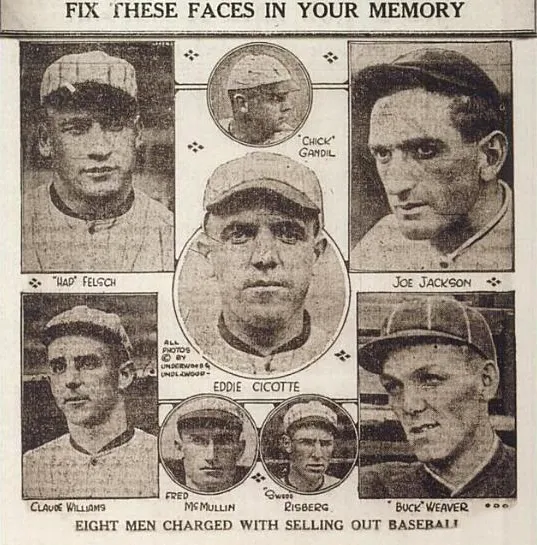The 1919 Black Sox Baseball Scandal Was Just One of Many
They say baseball “lost its innocence” after 1919, but betting and other improper behavior was rampant in early-20th-century baseball
/https://tf-cmsv2-smithsonianmag-media.s3.amazonaws.com/filer/33/94/3394477c-9f16-4b8c-bef8-64dfb42ecc83/1919_chicago_white_sox.jpg)
Although the 1919 Black Sox scandal has been portrayed as a unique event, baseball history indicates that throwing games likely happened a lot more than once.
In the 1919 scandal, eight members of the Chicago White Sox were found to have accepted money from gamblers to throw the World Series. Historians and journalists who have studied the scandal say that it didn’t happen in a vacuum–the culture of major league baseball and how the players were paid helped to shape the problem.
Understanding the Black Sox scandal
“I think it would be fair to say the Black Sox scandal was not a unique event,” baseball historian Steve Steinberg told Brian Blickenstaff, who was writing for Vice Sports. It’s hard to say how often it might have happened that a team threw a game or series for money, he said, but based on his knowledge of baseball’s past, he believes it certainly wasn’t confined to one series.
In fact, Evan Andrews writes for History.com, in spite of persistent rumors about the fix, “baseball’s leading figures appeared content to let the 1919 World Series go unexamined.” The thing that brought the possibility under the eyes of investigators was a rigged regular season game between the Chicago Cubs and the Philadelphia Phillies.
“A grand jury convened, and speculation soon turned to the previous year’s World Series,” the website writes.
“I don’t know why I did it… I needed the money. I had the wife and kids,” White Sox pitcher Eddie Cicotte confessed to the jury, prompting a series of confessions from other players. In total, eight men were indicted for conspiracy. They were ultimately found not guilty–though their careers were over and they would now be known in popular media as the "Black Sox," writes Andrews.

Players didn't feel they were paid fairly, which may have led to the scandals
As Jack Moore writes for Vice Sports, the method of compensating players for their participation in the World Series changed in 1918. This change, which caused the Boston Red Sox to strike, shows the precarious financial situation players found themselves in at the hands of team owners.
Previously, he writes, the players on the two World Series teams received their pay from ticket revenue, but in 1918, the National Commission decided that teams would be paid a flat rate. That rate, of course, was less than they would have received before. “While the change was reported in the papers that winter, the news was never directly relayed to the players—not that they had any formal recourse if they disagreed with the new policy.”
Although the policy was reversed after 1918, it left a lasting impact, as seen in the 1919 World Series.
“In a way, baseball got its just desserts that World Series, which the White Sox players were willing to dump—jeopardizing their livelihoods, their legacies, and even their freedom for a mere $20,000, simply because the owners refused to share the pie,” Moore writes.
A previous fix may have been part of the reason for the 1919 fix
Besides the money, there may have been another reason for what happened in 1919. In 1927, Charles "Swede" Risberg, the ringleader of the eight Black Sox, told the Chicago Tribune that he knew about four rigged games between the White Sox and the Detroit Tigers, and that the entire Detroit team knew too. Those games were played in two double-headers on Sept. 2 and 3, 1917.
Baseball commissioner Kenesaw Landis called Risberg in to testify, and he confirmed what he said to the paper. He also linked those games to the 1919 scandal, alleging that the games were “thrown by Detroit in exchange for money, and that Chicago had thrown three games in 1919 as a kind of belated thank you.”
After hearing further testimony, the commissioner ruled that the fix hadn’t taken place–although money had changed hands for some reason between the White Sox and the Tigers, writes Blickenstaff. He then ruled that baseball teams could no longer give money to other teams for any reason and that players who bet on other baseball games would be banned for a year—players that bet on their own games would be banned for life.